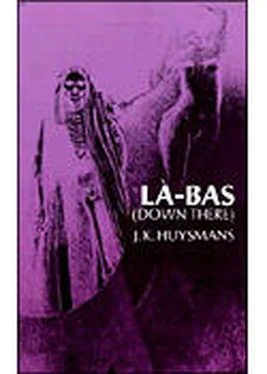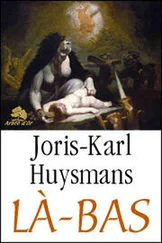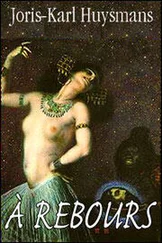Joris-Karl Huysmans - Down There (Là-Bas)
Здесь есть возможность читать онлайн «Joris-Karl Huysmans - Down There (Là-Bas)» весь текст электронной книги совершенно бесплатно (целиком полную версию без сокращений). В некоторых случаях можно слушать аудио, скачать через торрент в формате fb2 и присутствует краткое содержание. Жанр: Классическая проза, на английском языке. Описание произведения, (предисловие) а так же отзывы посетителей доступны на портале библиотеки ЛибКат.
- Название:Down There (Là-Bas)
- Автор:
- Жанр:
- Год:неизвестен
- ISBN:нет данных
- Рейтинг книги:3 / 5. Голосов: 1
-
Избранное:Добавить в избранное
- Отзывы:
-
Ваша оценка:
- 60
- 1
- 2
- 3
- 4
- 5
Down There (Là-Bas): краткое содержание, описание и аннотация
Предлагаем к чтению аннотацию, описание, краткое содержание или предисловие (зависит от того, что написал сам автор книги «Down There (Là-Bas)»). Если вы не нашли необходимую информацию о книге — напишите в комментариях, мы постараемся отыскать её.
Down There (Là-Bas) — читать онлайн бесплатно полную книгу (весь текст) целиком
Ниже представлен текст книги, разбитый по страницам. Система сохранения места последней прочитанной страницы, позволяет с удобством читать онлайн бесплатно книгу «Down There (Là-Bas)», без необходимости каждый раз заново искать на чём Вы остановились. Поставьте закладку, и сможете в любой момент перейти на страницу, на которой закончили чтение.
Интервал:
Закладка:
It was without its equivalent in literature. A few pages of Anne Emmerich upon the Passion, though comparatively attenuated, approached this ideal of supernatural realism and of veridic and exsurrected life. Perhaps, too, certain effusions of Ruysbroeck, seeming to spurt forth in twin jets of black and white flame, were worthy of comparison with the divine befoulment of Grünewald. Hardly, either. Grünewald's masterpiece remained unique. It was at the same time infinite and of earth earthy.
"But," said Durtal to himself, rousing out of his revery, "if I am consistent I shall have to come around to the Catholicism of the Middle Ages, to mystic naturalism. Ah, no! I will not-and yet, perhaps I may!"
Here he was in the old dilemma. How often before now had he halted on the threshold of Catholicism, sounding himself thoroughly and finding always that he had no faith. Decidedly there had been no effort on the part of God to reclaim him, and he himself had never possessed the kind of will that permits one to let oneself go, trustingly, without reserve, into the sheltering shadows of immutable dogma.
Momentarily at times when, after reading certain books, his disgust for everyday life was accentuated, he longed for lenitive hours in a cloister, where the monotonous chant of prayers in an incense-laden atmosphere would bring on a somnolence, a dreamy rapture of mystical ideas. But only a simple soul, on which life's wear and tear had left no mark, was capable of savouring the delights of such a self-abandon, and his own soul was battered and torn with earthly conflict. He must admit that the momentary desire to believe, to take refuge in the timeless, proceeded from a multitude of ignoble motives: from lassitude with the petty and repeated annoyances of existence, quarrels with the laundress, with the waiter, with the landlord; the sordid scramble for money; in a word, from the general spiritual failure of a man approaching forty. He thought of escaping into a monastery somewhat as street girls think of going into a house where they will be free from the dangers of the chase, from worry about food and lodging, and where they will not have to do their own washing and ironing.
Unmarried, without settled income, the voice of carnality now practically stilled in him, he sometimes cursed the existence he had shaped for himself. At times, weary of attempting to coerce words to do his bidding, he threw down his pen and looked into the future. He could see nothing ahead of him but bitterness and cause for alarm, and, seeking consolation, he was forced to admit that only religion could heal, but religion demanded in return so arrant a desertion of common sense, so pusillanimous a willingness to be astonished at nothing, that he threw up his hands and begged off.
Yet he was always playing with the thought, indeed he could not escape it. For though religion was without foundation it was also without limit and promised a complete escape from earth into dizzy, unexplored altitudes. Then, too, Durtal was attracted to the Church by its intimate and ecstatic art, the splendour of its legends, and the radiant naïveté of the histories of its saints.
He did not believe, and yet he admitted the supernatural. Right here on earth how could any of us deny that we are hemmed in by mystery, in our homes, in the street,-everywhere when we came to think of it? It was really the part of shallowness to ignore those extrahuman relations and account for the unforeseen by attributing to fate the more than inexplicable. Did not a chance encounter often decide the entire life of a man? What was love, what the other incomprehensible shaping influences? And, knottiest enigma of all, what was money?
There one found oneself confronted by primordial organic law, atrocious edicts promulgated at the very beginning of the world and applied ever since.
The rules were precise and invariable. Money attracted money, accumulating always in the same places, going by preference to the scoundrelly and the mediocre. When, by an inscrutable exception, it heaped up in the coffers of a rich man who was not a miser nor a murderer, it stood idle, incapable of resolving itself into a force for good, however charitable the hands which fain would administer it. One would say it was angry at having got into the wrong box and avenged itself by going into voluntary paralysis when possessed by one who was neither a sharper nor an ass.
It acted still more strangely when by some extraordinary chance it strayed into the home of a poor man. Immediately it defiled the clean, debauched the chaste, and, acting simultaneously on the body and the soul, it insinuated into its possessor a base selfishness, an ignoble pride; it suggested that he spend for himself alone; it made the humble man a boor, the generous man a skinflint. In one second it changed every habit, revolutionized every idea, metamorphosed the most deeply rooted passions.
It was the instigator and vigilant accomplice of all the important sins. If it permitted one of its detainers to forget himself and bestow a boon it awakened hatred in the recipient, it replaced avarice with ingratitude and re-established equilibrium so that the account might balance and not one sin of commission be wanting.
But it reached its real height of monstrosity when, concealing its identity under an assumed name, it entitled itself capital. Then its action was not limited to individual incitation to theft and murder but extended to the entire human race. With one word capital decided monopolies, erected banks, cornered necessities, and, if it wished, caused thousands of human beings to starve to death.
And it grew and begot itself while slumbering in a safe, and the Two Worlds adored it on bended knee, dying of desire before it as before a God.
Well! money was the devil, otherwise its mastery of souls was inexplicable. And how many other mysteries, equally unintelligible, how many other phenomena were there to make a reflective man shudder!
"But," thought Durtal, "seeing that there are so many more things betwixt heaven and earth than are dreamed of in anybody's philosophy, why not believe in the Trinity? Why reject the divinity of Christ? It is no strain on one to admit the Credo quia absurdum of Saint Augustine and Tertullian and say that if the supernatural were comprehensible it would not be supernatural, and that precisely because it passes the faculties of man it is divine.
"And-oh, to hell with it! What's it all about, anyway?"
And again, as so often when he had found himself before this unbridgeable gulf between reason and belief, he recoiled from the leap.
Well, his thoughts had strayed far from the subject of that naturalism so reviled by Des Hermies. He returned to Grünewald and said to himself that the great Crucifixion was the masterpiece of an art driven out of bounds. One need not go far in search of the extra-terrestrial as to fall into perfervid Catholicism. Perhaps spiritualism would give one all one required to formulate a supernaturalistic method.
He rose and went into his tiny workroom. His pile of manuscript notes about the Marshal de Rais, surnamed Bluebeard, looked at him derisively from the table where they were piled.
"All the same," he said, "it's good to be here, in out of the world and above the limits of time. To live in another age, never read a newspaper, not even know that the theatres exist-ah, what a dream! To dwell with Bluebeard and forget the grocer on the corner and all the other petty little criminals of an age perfectly typified by the café waiter who ravishes the boss's daughter-the goose who lays the golden egg, as he calls her-so that she will have to marry him!"
Bed was a good place, he added, smiling, for he saw his cat, a creature with a perfect time sense, regarding him uneasily as if to remind him of their common convenience and to reproach him for not having prepared the couch. Durtal arranged the pillows and pulled back the coverlet, and the cat jumped to the foot of the bed but remained humped up, tail coiled beneath him, waiting till his master was stretched out at length before burrowing a little hollow to curl up in.
Читать дальшеИнтервал:
Закладка:
Похожие книги на «Down There (Là-Bas)»
Представляем Вашему вниманию похожие книги на «Down There (Là-Bas)» списком для выбора. Мы отобрали схожую по названию и смыслу литературу в надежде предоставить читателям больше вариантов отыскать новые, интересные, ещё непрочитанные произведения.
Обсуждение, отзывы о книге «Down There (Là-Bas)» и просто собственные мнения читателей. Оставьте ваши комментарии, напишите, что Вы думаете о произведении, его смысле или главных героях. Укажите что конкретно понравилось, а что нет, и почему Вы так считаете.












